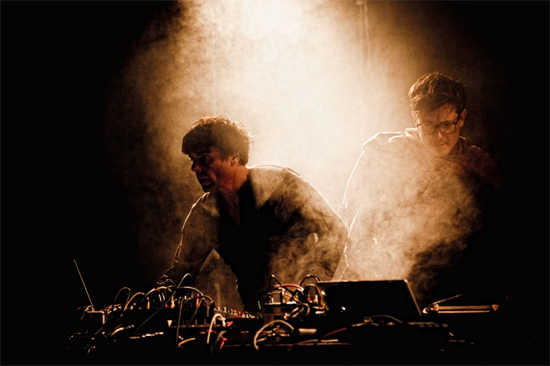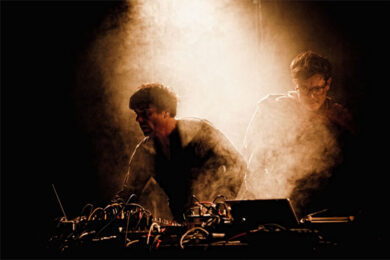Long-running German electronic duo Mouse On Mars are collaborating with conductor Andre De Ridder and Cologne ensemble musikFabric for the UK premiere of their orchestral piece Paenumnion, this Friday (25th November) at the Barbican.
During the piece the duo – Andi Toma and Jan St. Werner – play their own electronic instruments and process the live sound of the orchestra. musikFabrik will ‘transform themselves and their instruments into an extension of the Mouse on Mars aesthetic by playing in deeply unconventional ways. With André de Ridder at the helm, this is not a “live remix” but a coherent body of music which falls into three very different movements.’
Support for the show is illustrious indeed – glitch pioneer Oval (aka Marcus Popp), and a performance of Karlheinz Stockhausen’s 1956 tape piece Gesang der Jünglinge. They complete an impressive night of exploratory music that looks set to explore the boundaries between the acoustic and electronic worlds. For more information and tickets, visit the Barbican website.
In advance of the show, we spoke to Mouse On Mars’ Jan St. Werner about the genesis of Paenumnion, the differences between working with Mark E. Smith and working with an orchestra, and the "utopian" aspect to their music.
How did the collaboration with Andre De Ridder and musikFabrik come about?
Jan St. Werner: I’d had some ideas for some pieces which I wanted to do with an ensemble. I didn’t really have a clear idea, and Andre was really helpful. He introduced me to Kaleidoscope, a string ensemble from Berlin, and I actually realised one of my pieces with them last year. Then there were other smaller things, and eventually we came closer to this big idea that Andi and me had for quite a while, and Andre was happy to pick us up and carry that idea with him.
Eventually, when the Cologne Symphony Hall had their 25th anniversary, they came to our studio and we told them about this idea, and they had interest to do something special and something different for their anniversary programme. They brought the money that you need to do such a big project, and so with them and musikFabrik, which is an ensemble from Cologne, we were able to realise this first edition.
You performed it in September in Cologne. How did it go?
JSW: It went really well. We had a preview version of this in Chicago [too]. It’s funny, it seems like 2011 was our orchestral year or something, because we had this invitation from Chicago symphony to come over and do a workshop with them and realise some musical ideas with them. So we had a loose collection of ideas and things, and did a performance with them in Chicago in January, which was really helpful because we really understood what’s really hard to translate and what works really well.
So that would be the first ever, pre-version of this project. Then Cologne worked much better than Chicago, because of the experiences we had, and we had more time, and working with musikFabrik was very helpful. They really like this microtonal stuff and they have an amazing expertise in new music and extremely hard to play pieces. So we found a really good compromise, because we were actually ready to be much more accessible with the Cologne piece [than with the Chicago project], but then had an ensemble which was much more willing to be radical and extreme. That opened a huge space, which really helped to make this whole thing come across really well.
Did the Cologne show help you think ‘there are some changes we need to make’?
JSW: We made it a bit more tight, and we cut out some bits. It will be played differently anyway, because it’s changing every time it’s being played, but it’s definitely the same piece.
With classical music it’s so much harder to understand structures and intuitively think, ‘Ok, this could become something’, or ‘This isn’t really leading anywhere’. With Andre it’s great, because he knows so many places and he has such good intuition. It was really good to work with him, not only artistically but in terms of when is the right moment, who is the right ensemble to work with. That is gold, really.
I think it’s the wish of a lot of musicians to be able to work with great musicians who translate your music into this realm of, not necessarily classical music, but into this realm where every note is performed by a human being on a classical instrument. Not just for the sake of the instrument being classical, but it has something very profound. It’s an instrument which we know to the smallest detail, and to perform music with such instruments is like a common code. It’s an acoustic alphabet we’re using that everyone knows – even kids know the sound of an orchestra. When you’re able to translate your music into this, it’s a really interesting tension that you can create, because you don’t surprise people with new sounds or with your own idiosyncratic sound signature. It’s a very official, standardised language with which you create this tension.
And I think it’s kind of a certain goal [every musician] has – you just want to know how your stuff sounds on such a standard monitor system. If you have that with an orchestra, suddenly you realise ‘Wow, ok, my music is totally crap, it just sounds like idiot music, it’s totally cliche’. It’s only because we use [our own] sounds that makes it sound interesting. We had those moments, where we thought, ‘It only works when we have our own sound’. But that was also the challenge: musically, where can we push a bit further?
I think a lot of people try to do this, or musicians would like to be able to do this, and can’t manage it in the end. Because it’s so much harder than you thought, and you run out of time, or energy, or budget, or whatever. But if you have someone like Andre, it really saves you from going down a lot of one-way streets and taking wrong turns. Having him was really essential, and kept a really high standard for us throughout the whole production.
What were the inspirations for the piece?
JSW: It was really just sound. Not so much certain genres or composers or new music we like, or 20th century avant-garde stuff. We like a lot of classical and orchestral music, but this is not like that. We didn’t want to compete with that or put our things next to that. It’s like music for a group of people that doesn’t exist. It isn’t defined, our music is playful and has certain codes or semantic structures which are basically like working with language, or a type of ethnic music which isn’t tied to a specific ethnic group.
This is how we see it, and working with the orchestra didn’t change much about this. It’s not really our intention [to make our music sound like any other genre or composer]. Of course these things feed through, but it’s not intended like this. It’s like an abstract story or a book you would read, where you would go through all these phases and perspectives. Or kind of like a shape, like a Rubik’s cube. You have these different sides, maybe initially plain coloured sides, and then you start screwing around, and in the end it’s quite a colourful mess. And maybe even the original form of the cube has changed a bit. This is always the utopian aspect in what we do. We think if we screw up that cube, we might even be able to change the form of the cube, and maybe end up with nine sides.
For a while I was really very bored with very mathematic, very steady beat, electronic, minimalistic music, but eventually I realised maybe it’s really important for these people to have this kind of music. Because maybe it’s all so messed up that they need a bit of organisation and order. And maybe Andi and me, and our friends, are all so incredibly organised in our minds that we can chop up everything around us and not get paranoid about that.
You worked with Mark E Smith a few years ago [as Von Sudenfed, and released the album Tromatic Reflexxions].
JSW: He’s a good example, he’s incredibly organised.
What’s easier – working with Smith, or working with an orchestra? I imagine he can be quite a challenge to work with.
JSW: In his own way, of course, he’s incredibly intense. It’s a completely different concept. An orchestra is really trained to behave, because it wouldn’t work. If you want to play in an orchestra, you agree to hold yourself back. And Mark E. Smith is exactly the opposite of course – which is why you want him, and why everyone likes him in his work – because he makes a point of not holding back. Maybe you can’t get more opposite than that. Which is kind of perfect, I think.
Andi and me, I think we always look for the moment where we could say ‘Ok, that’s enough, we’ve done something that we can’t get any further with’. There’s no need to make another version of that, or make this more detailed. But that’s what we look for. We look always for something where we could say ‘Ok, now we can really do something different, we can’t compete with that’. I think the project with Mark and this orchestral project are along the same lines as that.
So presumably you’re not planning to do any more with Mark in the future?
JSW: Taking what I just said, I think it’s cool that we did this, and we didn’t need to do another. But then we didn’t stop it, we didn’t finish it, and we of course could do another record. Maybe it could be completely different, and we could again question what we had done in the first place. The same people in the same configuration could do something that would wipe the first thing away. That would be great, if we could do something like that.



